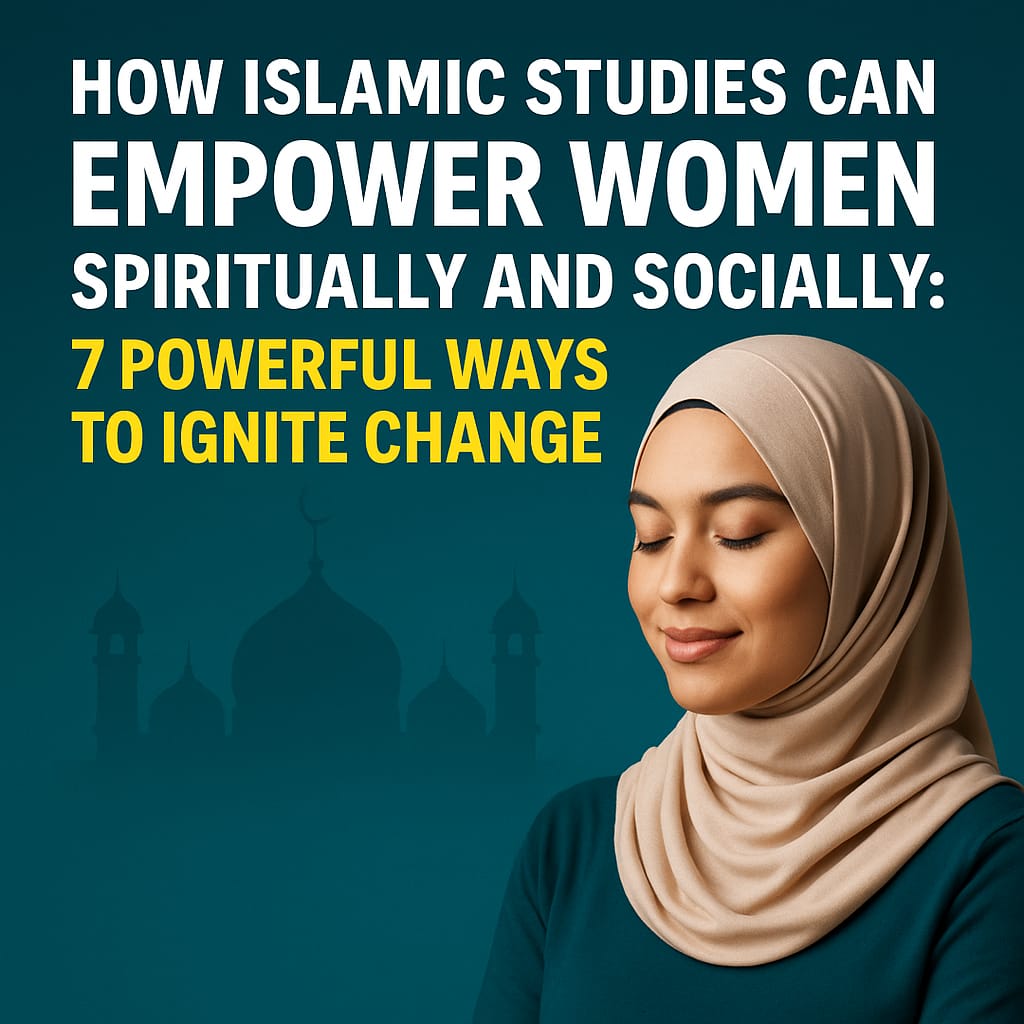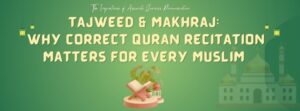Introduction: Why Islamic Studies Matter for Women Today
In a world constantly redefining the roles and expectations of women, Islamic Studies offers something profoundly different — clarity, purpose, and empowerment. For many women, connecting with their faith has proven to be not only spiritually enriching but also socially liberating. It equips them with knowledge that inspires confidence, helps them better fulfill their roles, and encourages them to be active contributors in their communities.

This article explores seven powerful ways Islamic education empowers women — spiritually, emotionally, and socially — and why more women are turning to it today.
Discover how Islamic knowledge strengthens identity, builds leadership, and nurtures personal transformation in women’s lives.
1. Understanding the True Role of Women in Islam
Many misconceptions surround the status of women in Islam. Often, they’re misrepresented through cultural lenses rather than religious texts. Islamic Studies helps dispel these myths by turning directly to the Qur’an and Hadith, where women are portrayed as teachers, leaders, scholars, caregivers, and even warriors.
Key Benefits:
- Women gain access to clear rights under Islamic law.
- Boosts confidence to advocate for their rightful place.
- Deepens appreciation of authentic Islamic teachings.
2. Enhancing Spiritual Growth and Connection to Allah
Spiritual growth becomes deeper and more personal with Islamic education. Through understanding Tafsir (Qur’anic interpretation), Fiqh (jurisprudence), Hadith (Prophetic traditions), and Islamic morals, this spiritual development evolves into a personal and meaningful connection with Allah.
Spiritual Empowerment Comes Through:
- Regular prayer and reflection guided by knowledge.
- Understanding divine wisdom and life’s purpose.
- Patience to overcome trials with a sense of meaning.
- Women become spiritually resilient, better equipped to deal with everyday challenges.
3. Building Self-Confidence Through Knowledge
To be powerful is to be confident. When women know their rights, they’re not just gaining intelligence — they’re building life-altering confidence. Political speeches, scholarship, and leadership in historical female figures like Aisha (RA) and Fatimah (RA) are proof of this legacy.
Confidence Is Built By:
- Gaining clarity on religious and social platforms.
- Actively challenging cultural distortions.
- Encouragement to mentor and educate others.
- Confidence born from knowledge is unshakable, especially when it’s rooted in truth.
4. Encouraging Female Scholarship and Leadership
Islamic history is rich with female scholars, poets, and teachers. Islamic institutions now carry this legacy by preparing a new generation of women for these leadership, educational, and civic spaces.
Opportunities for Leadership:
- Teaching Islamic subjects in schools and masjids.
- Leading women’s study circles or community programs.
- Writing books, research, and opinion columns.
- When women hold knowledge and faith, they uplift not just themselves but entire communities.
4. Encouraging Female Scholarship and Leadership
Islamic history is rich with female scholars, poets, and teachers. Islamic institutions now carry this legacy by preparing a new generation of women for these leadership, educational, and civic spaces.
Opportunities for Leadership:
- Teaching Islamic subjects in schools and masjids.
- Leading women’s study circles or community programs.
- Writing books, research, and opinion columns.
- When women hold knowledge and faith, they uplift not just themselves but entire communities.
5. Social Implications of Women’s Islamic Education
Islamic education does not merely nurture the soul — it plays a vital role in transforming society. Educated Muslim women bring positive change to their families, communities, and society as a whole. Let’s explore how.
Strengthening Family Units:
A woman grounded in Islamic knowledge understands her responsibilities and rights as a mother, wife, daughter, and sister. She teaches Islamic values to her children and nurtures them with compassion and discipline. As the Prophet Muhammad ﷺ said:
“The best among you are those who are best to their families.” – (Tirmidhi)
Community Engagement and Leadership:
With proper Islamic education, women are equipped to serve their communities through da’wah, counseling, teaching, or volunteering. Across the globe, countless Muslim women lead women’s circles, Islamic schools, charity drives, and humanitarian missions. These are concrete examples of how women use their faith and knowledge to uplift others.
Social Justice and Advocacy:
Islam emphasizes justice and standing against oppression. Educated Muslim women are vocal in advocating for the rights of the oppressed, standing against domestic violence, and spreading awareness on women’s issues — all from an Islamic perspective. They become role models, especially for younger generations navigating modern challenges.
6. Overcoming Misconceptions About Islam and Women
Much of the world’s misunderstanding of Muslim women stems from misinformation, colonial narratives, and selective media portrayals. Let’s debunk some key myths:
Myth
Islam oppresses women |
Muslim women cannot be educated |
Hijab is a symbol of oppression |
Reality
Islam granted women rights centuries before the West. |
The Qur’an commands both men and women to seek knowledge. |
Many women wear hijab as a conscious act of faith and identity. |
By empowering women with authentic Islamic teachings, they become ambassadors of truth, challenging these stereotypes.
Real-Life Stories: Inspirational Muslim Women
Many women throughout history have used Islamic education as a springboard to greatness:
Fatima al-Fihri :
Founded the University of al-Qarawiyyin in Morocco in 859 CE — the world’s oldest existing, continually operating educational institution. A true icon of Islamic female scholarship.
Nana Asma’u :
A Nigerian scholar, poet, and education activist in the 19th century. She pioneered female literacy and religious education among Muslim women in West Africa.
Contemporary Scholars and Leaders :
Today, thousands of women across the globe are scholars, chaplains, counselors, educators, and spiritual mentors — many of them deeply rooted in Islamic studies.
7. Modern-Day Opportunities for Women in Islamic Studies
Thanks to digital platforms and global connectivity, access to Islamic learning is easier than ever.
Online Learning Platforms :
Many institutions now offer accredited degrees and courses in Islamic Studies for women, including:
Women-Only Islamic Seminars and Retreats :
These events are growing globally — fostering spiritual sisterhood, personal development, and communal support.
Social Media and Da’wah :
Many Muslim women are now content creators, using platforms like Instagram, YouTube, and TikTok to teach about Islam, modesty, family values, and spirituality.
FAQs: Frequently Asked Questions
Q1: Does Islam allow women to study religious sciences?
A: Absolutely. Islam encourages both men and women to seek knowledge. Many female companions of the Prophet ﷺ were scholars and teachers.
Q2: Can a woman become an Islamic scholar?
A: Yes. Historically and currently, many women are recognized scholars, jurists, and authors of Islamic texts.
Q3: How does Islamic education empower women spiritually?
A: It connects them with Allah, increases taqwa (consciousness of God), and strengthens their identity and purpose.
Q4: What if a woman doesn’t have access to an Islamic school or mosque?
A: She can pursue online learning, attend webinars, and join virtual halaqas. Many resources are freely available today.
Q5: Is Islamic education only about religious rituals?
A: No. It covers holistic development: ethics, rights, leadership, family roles, and social responsibilities.
Conclusion: The Way Forward
Islamic Studies is a powerful tool — not just for religious practice but for holistic empowerment. Spiritually, it strengthens a woman’s connection with her Creator. Socially, it enables her to become a positive force in her home and community. When women are grounded in Islamic knowledge, they become educators, advocates, counselors, leaders, and changemakers.




